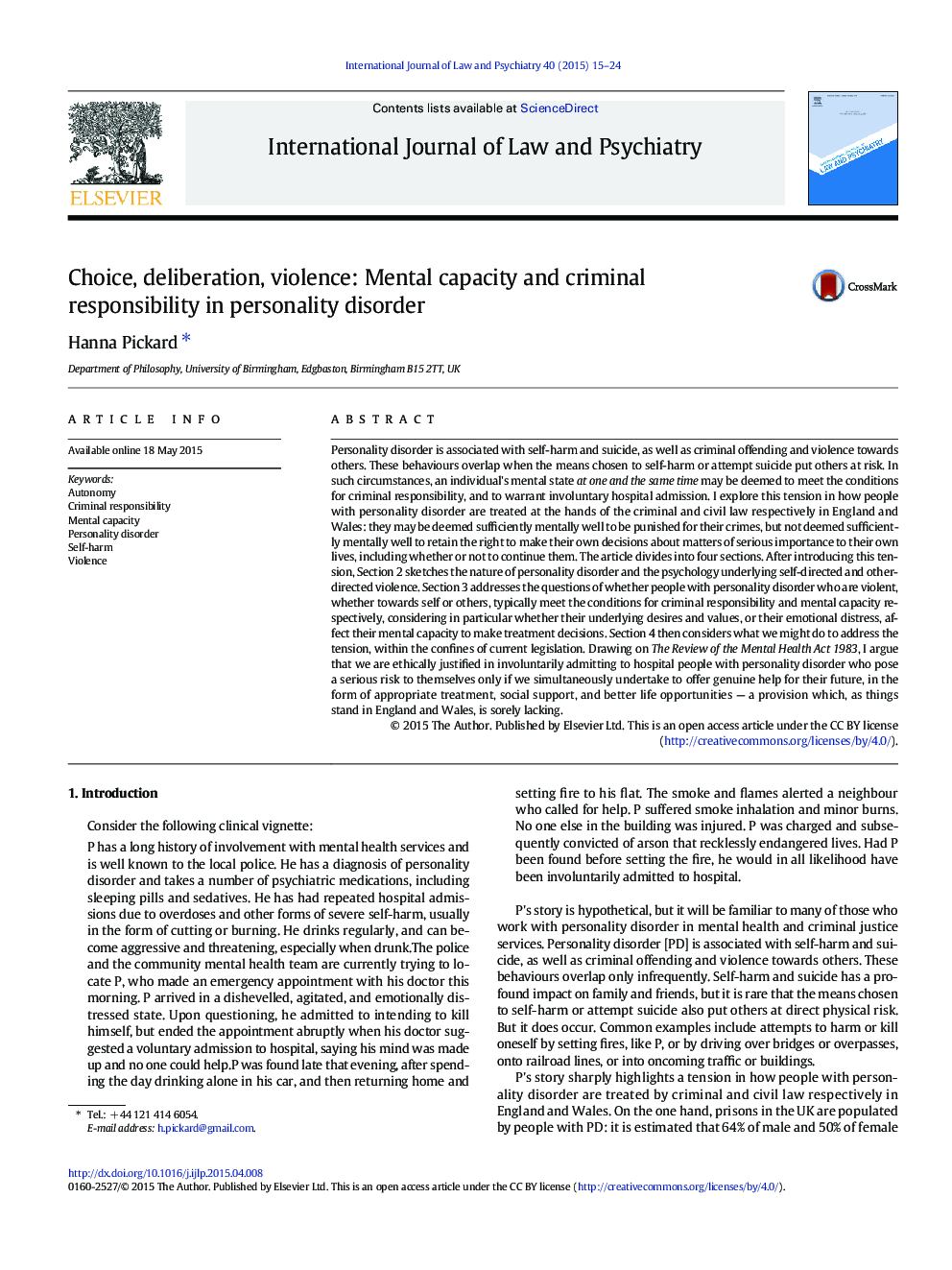| کد مقاله | کد نشریه | سال انتشار | مقاله انگلیسی | نسخه تمام متن |
|---|---|---|---|---|
| 6554656 | 1422281 | 2015 | 10 صفحه PDF | دانلود رایگان |
عنوان انگلیسی مقاله ISI
Choice, deliberation, violence: Mental capacity and criminal responsibility in personality disorder
ترجمه فارسی عنوان
انتخاب، مشورت، خشونت: ظرفیت ذهنی و مسئولیت کیفری در اختلال شخصیت
دانلود مقاله + سفارش ترجمه
دانلود مقاله ISI انگلیسی
رایگان برای ایرانیان
کلمات کلیدی
استقلال، مسئولیت کیفری، ظرفیت ذهنی، اختلال شخصیت، صدمه زدن به خود، خشونت،
ترجمه چکیده
اختلال شخصیت با خود آسیب و خودکشی، و همچنین تخلفات جنایی و خشونت نسبت به دیگران مرتبط است. این رفتارها هنگامی که ابزار انتخاب شده برای آسیب زدن به خود یا تلاش برای خودکشی دیگران را در معرض خطر قرار می دهند، همپوشانی دارند. در چنین شرایطی، وضعیت ذهنی یک فرد در یک زمان ممکن ممکن است مطابق شرایط مسئولیت کیفری و مجاز بودن پذیرش بیمارستان باشد. من کشش این کشمکش را در مورد اینکه چگونه افراد مبتلا به اختلال شخصیت به واسطه قوانین جنایی و مدنی در انگلستان و ولز تحت درمان قرار می گیرند: آنها ممکن است به اندازه کافی ذهنی به جرم آنها مجازات شوند، اما به اندازه کافی منطقی به نظر نمی رسد حق تصمیم گیری خود را در مورد اهمیت جدی برای زندگی خود، از جمله اینکه آیا آنها را ادامه دهید یا نه. این مقاله به چهار بخش تقسیم می شود. پس از معرفی این تنش، بخش 2 ماهیت اختلال شخصیت و روانشناسی را تحت عنوان خشونت مبتنی بر خودگردان و دیگری هدایت می کند. بخش سوم سوالاتی را مطرح می کند که آیا افراد مبتلا به اختلال شخصیت خشونت آمیز، چه در مورد خود و چه در دیگران، به طور معمول بر اساس شرایط مسئولیت کیفری و ظرفیت ذهنی مطابقت دارند، به ویژه با توجه به این که آیا خواسته ها و ارزش های اساسی آنها یا ناراحتی های احساسی آنها بر آنها تاثیر می گذارد توانایی ذهنی برای تصمیم گیری درمانی. بخش 4 سپس آنچه را که ما ممکن است برای رسیدگی به تنش، در درون قوانین فعلی بررسی کنیم، بررسی می کنیم. بر اساس بررسی قانون سلامت روان سال 1983، من استدلال می کنم که از نظر اخلاقی در موارد غیرمعتبر پذیرفته شده به بیمارانی که مبتلا به اختلال شخصیت هستند و به عنوان یک خطر جدی در برابر خود قرار می گیرند، توجیه می شود، از درمان مناسب، حمایت اجتماعی و فرصت های زندگی بهتر - مقرری که در انگلستان و ولز وجود دارد، به شدت فقیر است.
موضوعات مرتبط
علوم پزشکی و سلامت
پزشکی و دندانپزشکی
پزشکی قانونی
چکیده انگلیسی
Personality disorder is associated with self-harm and suicide, as well as criminal offending and violence towards others. These behaviours overlap when the means chosen to self-harm or attempt suicide put others at risk. In such circumstances, an individual's mental state at one and the same time may be deemed to meet the conditions for criminal responsibility, and to warrant involuntary hospital admission. I explore this tension in how people with personality disorder are treated at the hands of the criminal and civil law respectively in England and Wales: they may be deemed sufficiently mentally well to be punished for their crimes, but not deemed sufficiently mentally well to retain the right to make their own decisions about matters of serious importance to their own lives, including whether or not to continue them. The article divides into four sections. After introducing this tension, Section 2 sketches the nature of personality disorder and the psychology underlying self-directed and other-directed violence. Section 3 addresses the questions of whether people with personality disorder who are violent, whether towards self or others, typically meet the conditions for criminal responsibility and mental capacity respectively, considering in particular whether their underlying desires and values, or their emotional distress, affect their mental capacity to make treatment decisions. Section 4 then considers what we might do to address the tension, within the confines of current legislation. Drawing on The Review of the Mental Health Act 1983, I argue that we are ethically justified in involuntarily admitting to hospital people with personality disorder who pose a serious risk to themselves only if we simultaneously undertake to offer genuine help for their future, in the form of appropriate treatment, social support, and better life opportunities - a provision which, as things stand in England and Wales, is sorely lacking.
ناشر
Database: Elsevier - ScienceDirect (ساینس دایرکت)
Journal: International Journal of Law and Psychiatry - Volume 40, MayâJune 2015, Pages 15-24
Journal: International Journal of Law and Psychiatry - Volume 40, MayâJune 2015, Pages 15-24
نویسندگان
Hanna Pickard,
